
Na Pali coast, Kaua’i — photo by me, taken two weeks ago
Although it isn’t real, doesn’t really exist, my self is giving me a hard time these days. It doesn’t like the cold, and wet, and slippery roads. (It yearns to be back in Kaua’i). It doesn’t like when things don’t work right. It doesn’t like feeling incompetent, trapped, endangered, lost, and scared. It doesn’t like feeling compelled to do things, though it gets a thrill from the feeling of having done them half way right. It’s impatient, and annoyed with most people, especially itself.
But none of it is real. There is no one, no time or space, no causality or agency, no life or death, no purpose or meaning. No ‘one’ to blame. And while the idea of that seems ludicrous, or horrifying, to most selves, my self finds it endlessly fascinating, even as it is constantly fooled (by itself, helped by other selves) into believing that all of these made-up things are absolutely real. It is utterly hopeless, tragic, absurd, and inescapable. And as obvious as all this is to me now, intellectually and intuitively, almost no one else seems to get it. I don’t blame them.
But my self (it seems) continues to write about this, as if somehow that might help, beyond making the “prison of the self” a bit more comfortable. And my self continues to write about collapse, and about living better, and about human nature and culture and how the world seemingly works, and about whatever else comes into my mind that seems, to my weary and bewildered and lost and scared self, worth writing down. I have no choice in the matter. I smile more, these days, and pay a little more attention to things up close, the sensuous stuff, and I make a bit more eye contact; my way of redecorating my little cell. But I understand, ridiculously, that nothing matters. All that our selves think of as real is just invention, story, the brain’s feverish patterning. Like the friends of Godot, I am waiting, hopelessly, for the impossible. And that’s fine.
PREPARING FOR CIVILIZATION’S COLLAPSE
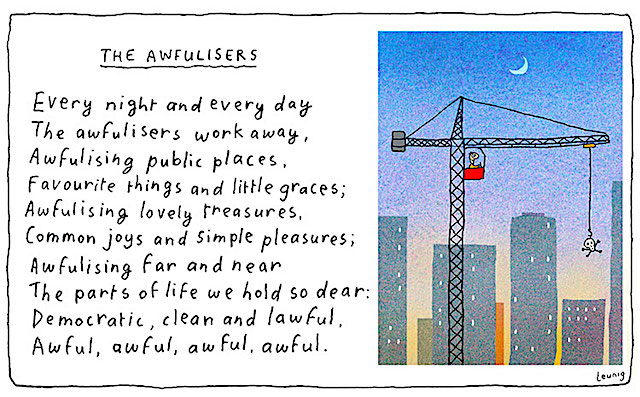
Cartoon by the awesome Michael Leunig
Would Human Extinction Be a Tragedy?: At least the NYT is allowing the odd Op-Ed to ask the question. The author’s answer is, of course, a qualified yes. And the inevitable anthropocentric arrogance pervades the article. But maybe one day we will seriously ask the question, probably when we’re burning the last of the forests and coal in a desperate effort to survive. For those still on FB, this group, which offers a very different and very human answer, is way ahead of the curve. Thanks to Derrick Jensen for the NYT link.
So You Think Forests Sequester Carbon?: Not if they’re burning.
Carbon Ideologies: A wonderfully-written book review by Nathaniel Rich of the prolific William Vollmann’s epic and despairing treatise Carbon Ideologies: “Nothing can be done to save the world as we know it; therefore, nothing need be done”, the book’s author writes. Nathaniel Rich, in his review, says “The demand problem, the growth problem, the complexity problem, the cost-benefit problem, the industry problem, the political problem, the generational-delay problem, the denial problem — Vollmann scrupulously catalogs all the major unsolved problems that contribute to the colossus of climate change”. Then he concludes:
[But] human nature is Vollmann’s true subject—as it must be. The story of climate change hangs on human behavior, not geophysics. Vollmann seeks to understand how “we could not only sustain, but accelerate the rise of atmospheric carbon levels, all the while expressing confusion, powerlessness and resentment.” Why did we take such insane risks? Could we have behaved any other way? Can we behave any other way? If not, what conclusions must we draw about our lives and our futures? Vollmann admits that even he has shied away from fully comprehending the damage we’ve done. “I had never loathed myself sufficiently to craft the punishment of full understanding,” he writes. “How could I? No one person could.” He’s right, though books like Carbon Ideologies will bring us closer.
The planet’s atmosphere will change but human nature won’t. Vollmann’s meager wish is for future readers to appreciate that they would have made the same mistakes we have. This might seem a humble ambition for a project of this scope, but only if you mistake Carbon Ideologies for a work of activism. Vollmann’s project is nothing so conventional. His “letter to the future” is a suicide note. He does not seek an intervention—only acceptance. If not forgiveness, then at least acceptance.
First, the Economy Collapses: Although climate collapse will finish off our teetering and unsustainable civilization, the inevitable first domino to fall will be the global industrial growth economy. Even those up on climate news are often unaware that economy and ecology are inextricably connected, and the crisis of a collapsed economy can come on much faster and create much more devastation much more quickly than climate events. Here’s an excellent 8-part explanation of why our economy is so fragile and over-extended, and what it will mean when it collapses beyond the capacity of bankrupt governments to put back together, from economist Mari Werner. Thanks to Daniele Colojacomo for the link, and the one that follows.
HyperNormalisation and Civilisational Collapse: A fascinating interview with British filmmaker Adam Curtis that espouses the view that much of the dread we feel about the coming collapse stems from the collective sense that the current insane state of the world is somehow normal and inevitable, from our naivete about power, and from the lack of imagination to conceive of anything different. His film is here.
The Looming Danger of Cults: When stress and suffering become overwhelming, desperate people often turn to cults — anyone who will give them an easy answer. I’ve met more than a few intelligent people who’ve fallen under the influence of cults, many of which have finely-honed, rehearsed messages designed to appeal to those with specific weaknesses and traumas, and many of which have ‘charismatic’ leaders and astonishingly-large and influential followers. Those who escape them are often terrified to reveal what they know due to fear of retribution from zealous, brainwashed followers. Sexual abuse seems particularly prevalent in many of these cults, along with bizarre diets, rituals and fetishes. Even large media organizations can be cowed by threats of legal action by many successful cults’ armies of lawyers. And young people, especially these days confused and insecure young males, seem particularly vulnerable to cults, which can recruit powerfully in the often-anxious and angry echo-chambers of social media. Some novels about post-collapse society describe communities and ‘tribes’ permeated by cults. I hope they’re wrong. More and more, I fear they’re not.
LIVING BETTER
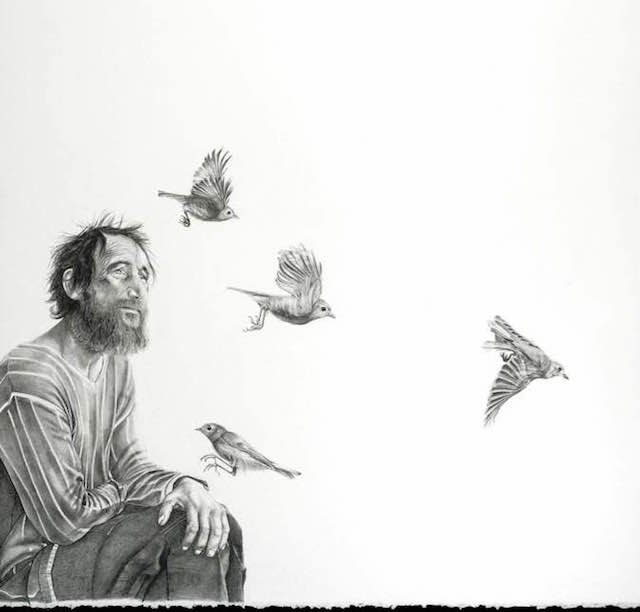
Sketch of St Francis, by the amazing Maryland-based artist Rebecca Clark
What the Green New Deal Really Means: It’s been deep-sixed by the Democrats as too radical, and is being discussed in more liberal countries, but it’s inevitable, and the sooner it’s embraced the better. But it will take much longer than the idealists think. The last New Deal only came into effect out of utter desperation after years of crushing depression. Once its fans realize the GND means massive government regulation (with strict enforcement and large penalties for violations), a huge redistribution of wealth through taxes, ends to subsidies and hundreds of new, expensive programs, it will be shut down. Until there is no choice. Problem is, by then the right-wingers will have bankrupted the government and given everything away to their rich friends, so there will be no money to implement it. But at least it’s out there, and we’ll see what our ‘leaders’ are made of, if we don’t already know.
Buy Safe, Healthy AND Cruelty-Free: Excellent lists of companies that produce safe and healthy cosmetic and chemical products (and those to avoid) are provided by EWG. Similar lists of companies that don’t test on animals or use animal products are provided by PETA. I only use products that make BOTH lists; they’re not easy to find, but they’re out there, and their products are outstanding as well as good for you and the world.
Don’t Talk to Me About Climate Change: George Monbiot suggests some new terms to use when talking about the crises facing our world, such as the following (thanks to Chris Dempsey for the link):
- Climate breakdown instead of climate change
- Our natural/living world instead of the environment
- Wildlife instead of natural capital/resources/stocks/assets
- Defending the planet instead of saving the planet
- Climate science denier instead of climate skeptic
- Refuges/sanctuaries instead of reserves
It Ain’t Easy Being LGBTQ: Nathaniel James clarifies that B is not G, and musician Laura Love explains why some WBW might legitimately want some of their own gatherings without T people invited, and might prefer other WBW as romantic partners, and that doesn’t mean they’re transphobic. Thanks to Tree Bressen for the second link and the one that follows.
Homeless Are Doin’ It For Themselves: A summary of the homeless self-organized activist movement in the US. As an interesting aside, despite Hoover’s horrific failure to manage his country and its suffering and homeless citizens through the Great Depression, he is celebrated in Belgium as the saviour of the nation’s starving during and after WW1.
The Tiny Nation of Užupis: A suburb of Vilnius has taken an April Fool’s joke and made it into a statement of what nationhood should really be about.
When Hate Comes to Your Town: How do you safely tell right-wing extremists their views aren’t welcome in your town?
Healing From Trauma: NHL superstar Theo Fleury talks about how he healed from years of sexual abuse, and how he almost didn’t. A moving story. Thanks to Beth Patterson for the link.
The Mushroom King Speaks Out: A rambling and fascinating interview with Paul Stamets, so famous for his knowledge of mushrooms and their mind-boggling uses they made him into a Star Trek character.
How to Pick Colours for Maps or Charts: Want to use colour to show gradation of a variable, or to clearly distinguish 12 or even 20 different lines or areas on a chart? Forget ROYGBIV and Internet Safe Colours, and give ColorBrewer a try. And here’s a link if you ever wondered why pink and brown aren’t in the rainbow.
When Should Serially Abusive Celebs/Leaders Be Allowed to Return to the Limelight?: Never. But what if they’re lynchpins of the whole organization? Same answer. Thanks to Tree Bressen for the second link.
POLITICS AND ECONOMICS AS USUAL
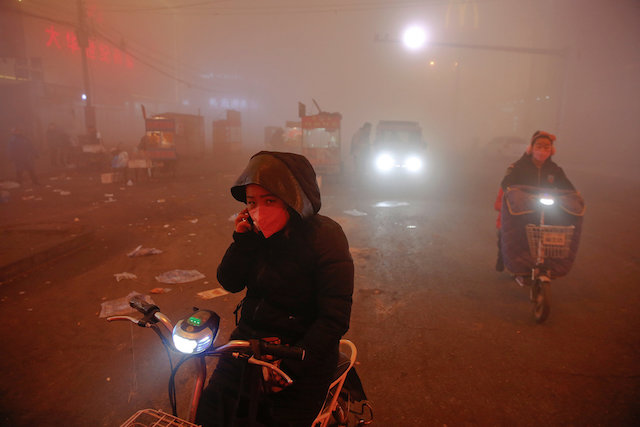
Severe smog pollution in China is now an everyday occurrence. Photo by Damir Sagoli for Reuters.
The Madness of the Alberta Tar Sands: Its poor quality, and the temporary oil glut created by large-scale fracking, has meant that the environmentally ruinous Tar Sands bitumen sludge, which costs $50-70/bbl to produce, is wholesaling for $16/bbl. Guess who’s subsidizing the difference?
Monsanto Bought Off Researchers to Pimp Roundup: Is anyone really surprised?
How Inequality Tears a City Apart: Vancouver’s soaring wealth disparity drives the poor and young out, and brings the rich and entitled in, making the city worse off for everyone, and making home prices utterly unsustainable. Here’s how serious the home price/income gap has become. And here’s how to mitigate it — if only we had the political will (at all levels of government).
How Russia Helped Trump Win: Everything we know so far, from Jane Mayer at the New Yorker. It’s more than you might think.
Warning from Poland: Trends in several European countries are reminiscent of the precursors to violent upheaval that led to world wars in the last century, and which are increasingly evident in the US as well. This is how it begins, says author Anne Applebaum. Thanks to Tree Bressen for the link.
Another Article About How Fake Images and Videos Change Our Perception of Truth: From Joshua Rothman at the New Yorker, another warning about the risks of manipulated media. I told you so.
Got Milked? The Dairy Industry’s Fake Research
IP Lawyers Run Amok: An Australian research organization essentially extorted a half billion dollars from Wi-Fi component manufacturers (costs passed along to us) by threatening to sue for much more, for something they arguably didn’t invent at all.
Screening the Use of Screens: There is increasing evidence that what is presented to us on all kinds of screens is addictive and leads to antisocial tendencies. And even that dependence on them decreases our motor function. Thanks to Tree Bressen for the links.
Fast Company Asks if Capitalism is the Real Problem: Oh, no, wait, they’ve taken that link down. Kind of guessed that was over the line. Sponsors couldn’t have been happy. Thanks to Shasta Martinuk for the catch.
FUN AND INSPIRATION
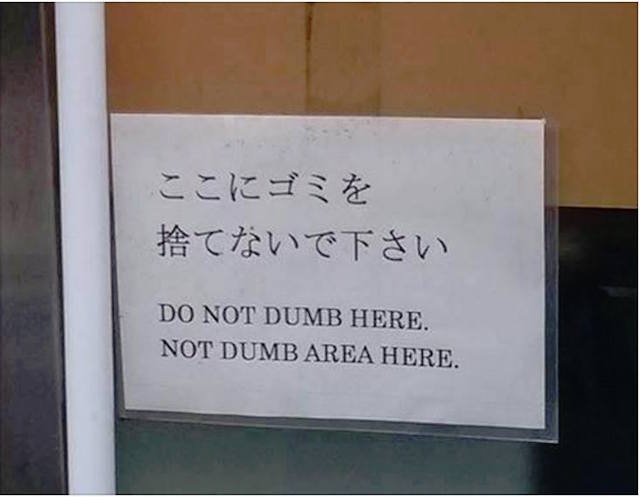
Photo via David Petraitis on FB — not sure if it’s his photo or not.
Tell a Sci-Fi Story in Six Words: Hundreds of people took John Kellden up on his challenge. My favourites?: “White guys in space with toys.” “In healing ritual, yesterday becomes someday.” “Show us how to be new.” Mine, of course? “It was realized there’s nothing separate.”
DJ Earworm Does It Again: The mashup master compiles the top 25 songs of 2018 into one blockbuster song/video, which is a lot better than any of the mostly mediocre derivative songs that make it up. Here’s last year’s masterpiece. They’re also pretty scathing portraits of pop music’s vapidity, superficiality and narcissism.
Most Romantic Dance Ever, or Just Creepy?: Zouk dance champions strut their stuff.
Nova Scotia Students Stumble On New Branch of Life: A species of living creature genetically distinct from the entire animal kingdom and the entire fungi kingdom was discovered — in two different forms — in a collection jar, by accident.
Christine Lavin: Laugh Til You Cry: The author of the notorious and fall-down funny (if somewhat dated) Sensitive New-Age Guys has a ton of lesser-known songs spanning four decades, from the gently satiric Attainable Love to the gorgeous The Kind of Love You Never Recover From.
The Seven Echo Chambers: An interesting new study sets aside traditional left-right labels and substitutes seven ‘tribes’ whose views are more internally consistent, and reveals that some of the issues Americans think of as divisive (like the importance and impact of ‘political correctness’) they actually overwhelmingly agree on. The Atlantic summarizes the findings. Thanks to Paul Heft for the link.
WTF is Holding Space: A Man’s Guide: An entertaining account of why men seem so unable to empathize, and why they’re often doing it wrong. Thanks to David Petraitis for the link.
The Indigenous Origins of Sign Language: A fascinating history of the uses of sign languages. Thanks to Chris Corrigan for the link.
Why Are Quality Headphones & Earbuds So Much Better Now?: Here’s a look at the surprisingly simple technology inside that makes all the difference.
A Mother Carries On Her Deceased Globetrotting Daughter’s Journey: Moving story of a local woman who discovered, after her daughter died at age 22 (7 years after being diagnosed with an inoperable brain tumour), that she was moved to continue her daughter’s travels.
People-Watching as Awareness Tool: A woman explains how teaching her kids to pay attention to details about people in crowds, just for fun, taught them to be wary for dangers that might not otherwise have noticed. Thanks to Tree Bressen for the link and the one that follows.
Out of the Woods: A moving and troubling true story about a woman’s discovery of a lost boy in the woods.
THOUGHTS FOR THE QUARTER
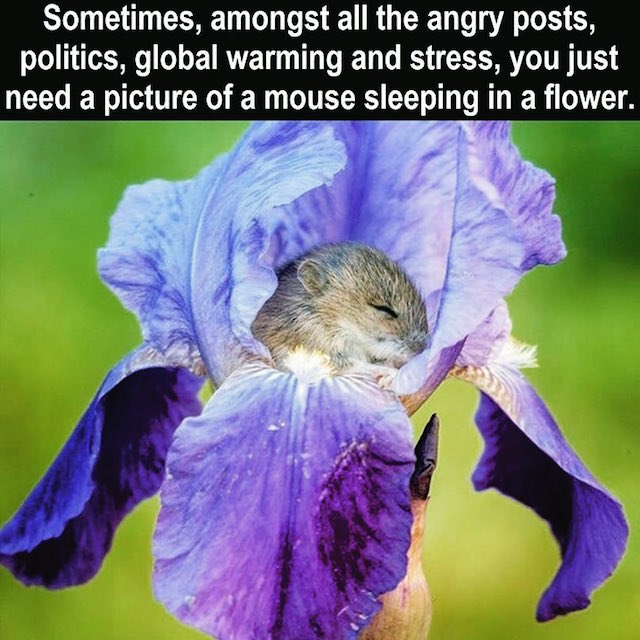
Photo going around on FB. No idea of original source or even if it’s real. Who can say anymore?
From a 2013 speech by Harry Leslie Smith, who died at age 97 in his adopted Canada in February. Thanks to Dick Jones for the link. “Then aged 93, he declared that he would never again wear a red poppy. He first went to Remembrance Sunday in 1928, and says: ‘I don’t remember whether people wore poppies but they wore their grief like jagged glass.’ “:
Over the last 10 years the sepia tone of November has become blood-soaked with paper poppies festooning the lapels of our politicians, newsreaders and business leaders. The most fortunate in our society have turned the solemnity of remembrance for fallen soldiers in ancient wars into a justification for our most recent armed conflicts. The American civil war’s General Sherman once said that “war is hell”, but unfortunately today’s politicians in Britain use past wars to bolster our flagging belief in national austerity or to compel us to surrender our rights as citizens, in the name of the public good.
Still, this year I shall wear the poppy as I have done for many years. I wear it because I am from that last generation who remember a war that encompassed the entire world. I wear the poppy because I can recall when Britain was actually threatened with a real invasion and how its citizens stood at the ready to defend her shores. But most importantly, I wear the poppy to commemorate those of my childhood friends and comrades who did not survive the second world war and those who came home physically and emotionally wounded from horrific battles that no poet or journalist could describe.
However, I am afraid it will be the last time that I will bear witness to those soldiers, airmen and sailors who are no more, at my local cenotaph. From now on, I will lament their passing in private because my despair is for those who live in this present world. I will no longer allow my obligation as a veteran to remember those who died in the great wars to be co-opted by current or former politicians to justify our folly in Iraq, our morally dubious war on terror and our elimination of one’s right to privacy.
Come 2014 when the government marks the beginning of the first world war with quotes from Rupert Brooke, Rudyard Kipling and other great jingoists from our past empire, I will declare myself a conscientious objector. We must remember that the historical past of this country is not like an episode of Downton Abbey where the rich are portrayed as thoughtful, benevolent masters to poor folk who need the guiding hand of the ruling classes to live a proper life.
I can tell you it didn’t happen that way because I was born nine years after the first world war began. I can attest that life for most people was spent in abject poverty where one laboured under brutal working conditions for little pay and lived in houses not fit to kennel a dog today. We must remember that the war was fought by the working classes who comprised 80% of Britain’s population in 1913.
This is why I find that the government’s intention to spend £50m to dress the slaughter of close to a million British soldiers in the 1914-18 conflict as a fight for freedom and democracy profane. Too many of the dead, from that horrendous war, didn’t know real freedom because they were poor and were never truly represented by their members of parliament.
My uncle and many of my relatives died in that war and they weren’t officers or NCOs; they were simple Tommies. They were like the hundreds of thousands of other boys who were sent to their slaughter by a government that didn’t care to represent their citizens if they were working poor and under-educated. My family members took the king’s shilling because they had little choice, whereas many others from similar economic backgrounds were strong-armed into enlisting by war propaganda or press-ganged into military service by their employers.
For many of you 1914 probably seems like a long time ago but I’m 93, so it feels recent. Today, we have allowed monolithic corporate institutions to set our national agenda. We have allowed vitriol to replace earnest debate and we have somehow deluded ourselves into thinking that wealth is wisdom. But by far the worst error we have made as a people is to think ourselves as taxpayers first and citizens second.
Next year, I won’t wear the poppy but I will until my last breath remember the past and the struggles my generation made to build this country into a civilised state for the working and middle classes. If we are to survive as a progressive nation we have to start tending to our living because the wounded: our poor, our underemployed youth, our hard-pressed middle class and our struggling seniors shouldn’t be left to die on the battleground of modern life.





Dave ‘I’ love ‘your’ musings on non selfness and hope you continue, even if at times they seem repetitive, ‘I’ always seem to want more. Though ‘I’ guess ‘I’ have no choice. Possible useful contemplation: how are some selves fascinated by the idea of no self, time, agency etc. and other selves are horrified by it. Truly interesting for ‘me’ if there is no choice being made.
Best,
David
A state of consciousness exists where we can escape ourselves- this can become at least an inconsistent habit with practice. This is of no consequence, there is only impermanence and the struggles of attachment. Agency is widely celebrated with a ‘true’ understanding of consciousness, yet fate can take the choice away in an instant. Letting go means more smiling and eye contact. Not a bad state to be in considering the concerning (and interesting) links of the month. On a very small but interconnected note our unusually small population of early summer Monarch butterflies (NZ) won’t lay any eggs and are very unsettled. These things don’t matter and yet myself still tries to make out there is choice all around? Humans celebrate their agency and seemingly understand nature in a very limited way. Ourselves do not know what is real, ignorance is all we can know.